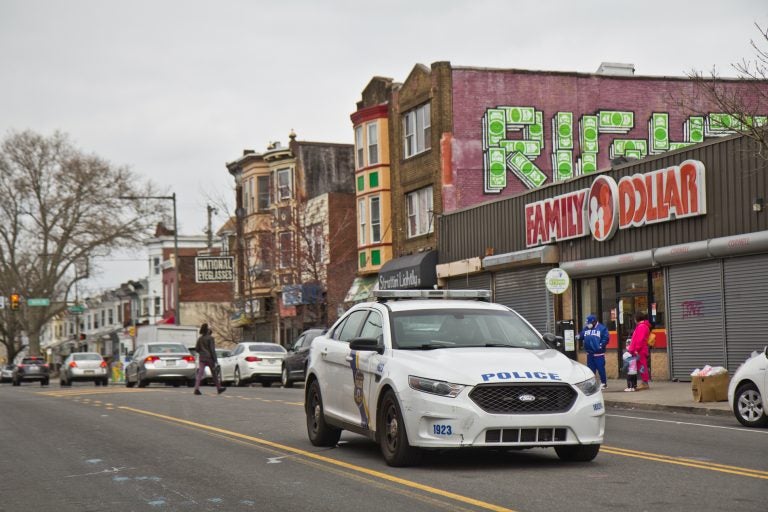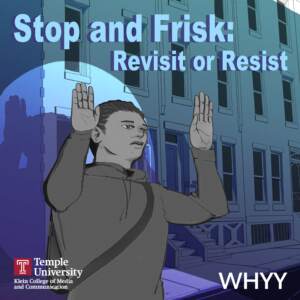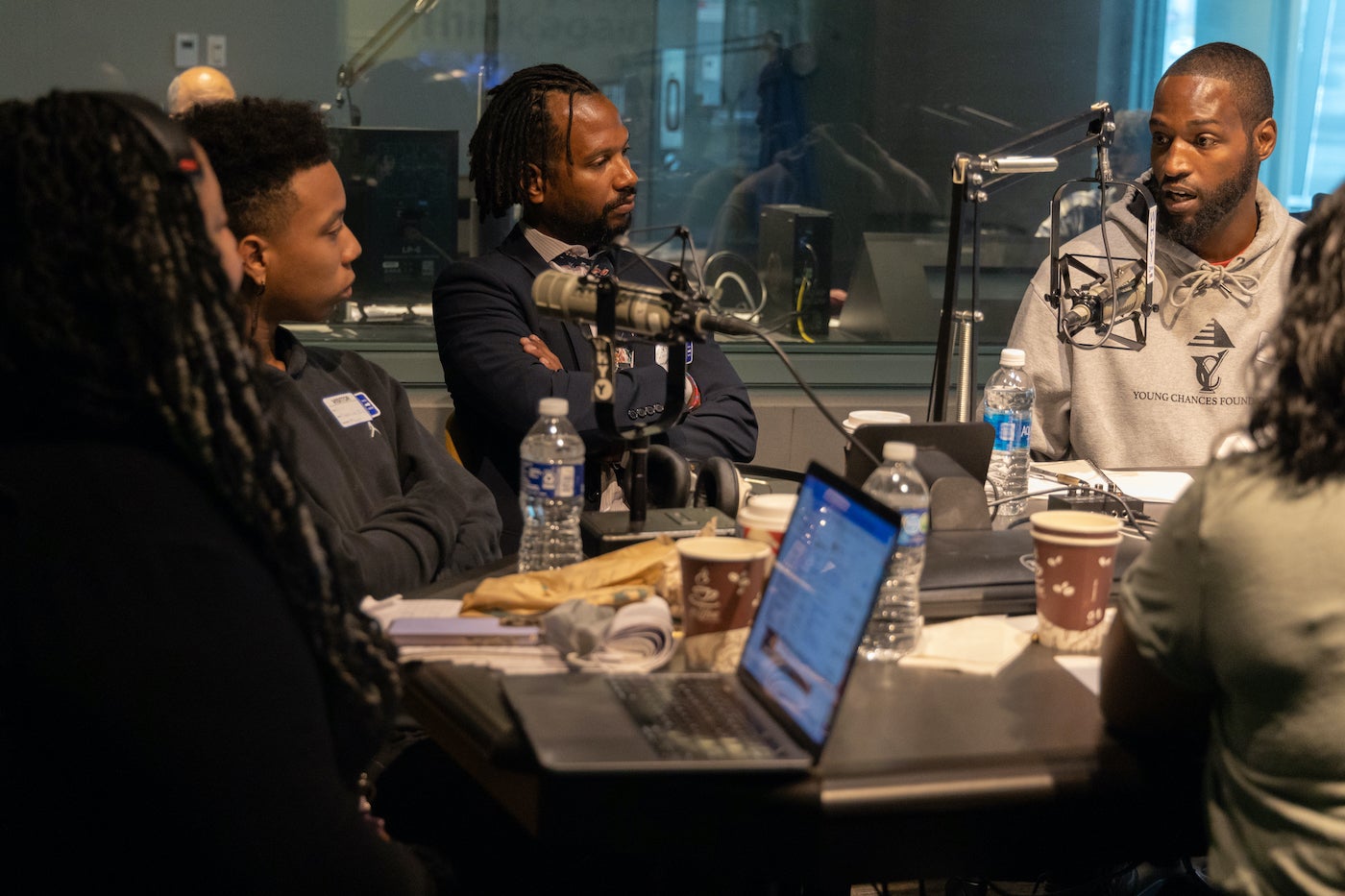Episode 2: The targets
While some older Black Philadelphians are calling for stop and frisk in Philadelphia, many young Black men in the city are terrified by the possibility.

A Philadelphia police cruiser is parked between Arch and Market streets in West Philadelphia on April 2, 2021. (Kimberly Paynter/WHYY)
This episode is from Stop and Frisk, a podcast production from WHYY News and Temple University’s Logan Center for Urban Investigative Reporting.
Find it on Apple Podcasts, Spotify, or wherever you get your podcasts.
-
Episode Transcript
SARAH GLOVER: HELLO. I’M SARAH GLOVER, WHYY’S VICE PRESIDENT OF NEWS AND CIVIC DIALOGUE. WHYY NEWS IS COMMITTED TO REPORTING ON SOLUTIONS TO PHILADELPHIA’S GUN VIOLENCE CRISIS. THIS PODCAST DIGS INTO THE CONVERSATION ABOUT STOP AND FRISK, GUN VIOLENCE, AND PUBLIC SAFETY IN THE CITY OF BROTHERLY LOVE. JOIN US AS WE TAKE AN IN DEPTH LOOK AT HOW WE GOT HERE. THIS IS A CONVERSATION PHILLY NEEDS TO HAVE.
SAMMY CAIOLA: JUST A HEADS-UP: THIS EPISODE CONTAINS PROFANITY, DESCRIPTIONS OF POLICE BRUTALITY, AND MURDER.
YVONNE: MOST OF US KNOW THAT NERVOUS FEELING YOU GET, WHEN THAT WAY-TOO-TALL ROLLER COASTER YOU PAID FOR BUT DON’T REALLY WANT TO RIDE INCHES SLOWLY TO THE TOP AND THEN SUDDENLY PLUMMETS…
Robert Lynch: There’s that drop feeling, that’s the feeling you get every time. It doesn’t feel right.
YVONNE: ROBERT LYNCH, A YOUNG BLACK PHILADELPHIAN, SAYS THAT’S WHAT BEING STOPPED AND FRISKED FEELS LIKE.
Robert: A very uncomfortable, adrenaline-rushing roller coaster ride you just don’t want to be on.
MUSIC
YVONNE: AND THAT ROLLERCOASTER RIDE, THAT SINKING, SCARY FEELING …STOP AND FRISK… WHICH MEANS POLICE CAN STOP ANYONE THEY THINK IS COMMITING A CRIME, IS BEING TALKED ABOUT IN NEIGHBORHOODS AND BATTED ABOUT IN CITY COUNCIL.
WITH SOME HOPING THAT, DESPITE ITS BAD TRACK RECORD AND RACIST IMPLEMENTATION, IT CAN HELP PHILADELPHIA FIGHT SOARING GUN VIOLENCE.
I’M YVONNE LATTY, DIRECTOR OF TEMPLE UNIVERSITY’S LOGAN CENTER FOR URBAN INVESTIGATIVE REPORTING.
SAMMY: AND I’M SAMMY CAIOLA, GUN VIOLENCE PREVENTION REPORTER AT WHYY.
YVONNE: THIS IS STOP AND FRISK: REVISIT OR RESIST, A PODCAST THAT LOOKS AT A CONTROVERSIAL POLICING METHOD BY A CITY WHOSE BACK IS UP AGAINST THE WALL. THIS IS EPISODE 2: THE TARGETS.
Tahmir: You’re going to have more opportunity to just stop and frisk and kill us. They don’t prey to the white targets they prey to the Black targets, Black men. Yeah, they can’t wait to shoot us. They can’t wait.
Jerome: We know driving while Black is an actual thing where my mother has to talk to me and tell me and warn me and give me proper precaution.
SAMMY: THERE HAVE BEEN MORE THAN 400 HOMICIDES IN PHILADELPHIA THIS YEAR, AND OVER 1500 SHOOTINGS… AND THOSE NUMBERS JUST KEEP GROWING AND GROWING…
YVONNE: PEOPLE ARE FEELING DESPERATE… THEY’RE GRAPPLING FOR ANY KIND OF SOLUTION THAT THEY THINK WILL DETER SHOOTINGS. EVEN IF IT’S POTENTIALLY HARMFUL.
SAMMY: THE PEOPLE MOST LIKELY TO BE TARGETED IN STOP AND FRISK… ARE YOUNG, BLACK MEN.
Tyler Campbell: Black men right now are dying at a rate of an endangered species. Every single day you have to be prepared with the understanding that something is waiting outside to kill you.
SAMMY: TYLER CAMPBELL IS 22. HE’S A PHILLY NATIVE, A POET AND A STUDENT AT COLUMBIA UNIVERSITY.
Tyler: There’s always this heightened emphasis on the perpetrators of crimes and, you know, why are individuals perpetrating crimes, carrying guns. But I think one of the things that isn’t getting talked about as much as it should be is, you know, what happens when, you know, you grow up in a community where you always feel like you’re under threat of, you know, dying or being shot or shot at, and how that kind of impacts your psyche and how you move through the world.
SAMMY: CAMPBELL CAN PINPOINT WHEN THE FEAR STARTED FOR HIM. HE WAS AT A STOPLIGHT WITH HIS PARENTS, NEAR A K-MART IN WEST PHILLY.
Tyler: I had to have been like no older than three or four, and we were stopped at the stoplight, as we’re standing there, sitting there, there comes these, like, three Black women just sprinting out of the store, you know, after having armed-robbed a place. And they come running out into the middle of traffic and, you know, they’re being chased by security and then a bunch of police cars pull up and, like, you know, begin to grab these women and throw them on the ground.
SAMMY: HE REMEMBERS SEEING THE JEWELRY THAT THEY’D STOLEN FALLING OUT ALL OVER THE PARKING LOT.
Tyler: It was like, one of those things that kind of, my first indoctrination into random acts of violence just unfolding right in front of me and around me. I remember, you know, after that happened, we kept going where we were going, you know, and it was just, like, you know, stuff like that isn’t normal, but yet it is made to feel normal.
MUSIC
YVONNE: SOME YOUNG BLACK MEN IN PHILLY TEND TO GET INTRODUCED TO VIOLENCE EARLY. IT’S ALL AROUND THEM, IN THEIR NEIGHBORHOODS, MAYBE IN THEIR OWN FAMILIES. AND OFTEN IT COMES FROM THE POLICE THEMSELVES.
Newscaster: The unarmed Black man was gunned down in his grandmother’s backyard last year. Police say they thought they saw a gun flash, it turned out to be a cell phone.
SOUNDS OF GUNFIRE
YVONNE: ACCORDING TO A 2020 STUDY FROM THE UNIVERSITY OF MICHIGAN, RUTGERS AND WASHINGTON UNIVERSITY, POLICE USE OF FORCE IS THE SIXTH- LEADING CAUSE OF DEATH FOR YOUNG MEN OF COLOR. THIS INCLUDES BEING SUFFOCATED, BEATEN, TASED OR SHOT… ABOUT 100 IN 100,000 BLACK MEN AND BOYS WILL BE KILLED BY POLICE.
Newscaster: There is growing outrage tonight after an unarmed African American teenager was shot and killed by police in the St. Louis suburb of Fergusson, Missouri.
Newscaster: Police responding to calls about an armed man, after telling him to put down a knife before opening fire.
SOUNDS OF GUNFIRE
SAMMY: SO IT’S NO SURPRISE THAT ANY CONVERSATION THAT OFFERS STOP AND FRISK AS A VIABLE SOLUTION TO GUN VIOLENCE IS MET WITH FEAR FROM BLACK MEN. WHETHER THEY RUN OR STAY STILL, DEATH IS A REAL POSSIBILITY.
YVONNE: WE WANTED TO HEAR HOW YOUNG MEN IN PHILLY ARE DEALING WITH THE VIOLENCE, AND THE POLICE, AND WHAT THEY THINK OF STOP AND FRISK. SO WE WENT TO WEST PHILLY…
VARIOUS CHATTER
…TO A ROW HOME ON THE CORNER OF SOUTH 53RD STREET. IT’S ON A TREE-LINED BLOCK IN A DIVERSE NEIGHBORHOOD. HEAD EAST, AND YOU’LL FIND THE GENTRIFIED CAFES AND COLLEGE BARS THAT HAVE SPRUNG UP AROUND PENN AND DREXEL. HEAD SOUTH, AND YOU’RE IN THE MIDDLE OF A NEIGHBORHOOD LEADING THE CITY IN SHOOTINGS… AND HOMICIDES.
BUT THIS PLACE IS A BREAK FROM ALL THAT.
James Aye: We actually want to go, like, straight upstairs.
YVONNE: THIS IS JAMES AYE, COFOUNDER OF YEAH PHILLY. THIS ROW HOME SERVES AS A COMMUNITY SPACE FOR YOUNG FOLKS WHO HAVE BEEN AFFECTED BY GUN VIOLENCE.
James: Some people downstairs are doing their music studio time.
YVONNE: YEAH STANDS FOR YOUTH EMPOWERMENT FOR ADVANCEMENT HANGOUT, AND THAT’S WHAT IT FEELS LIKE: A HANGOUT. THERE’S A COZY LIVING ROOM WITH BEAN BAG CHAIRS, VIDEO GAMES, A KITCHEN…
James: One of the young people, he can cook so he just got to cooking some general tso’s chicken and now everybody’s sleeping. He gave everybody the ‘itis.
YVONNE: ON THE SECOND FLOOR IS A GROUP OF KIDS LOUNGING PLAYING ON THEIR PHONES, AND WAITING FOR US TO LISTEN TO THEM. AND WHEN WE SET UP OUR MICS THEY HAVE STORIES TO TELL. AND FOR THESE YOUNG MEN, SOME WHO OWN GUNS OR ARE ON PAROLE, WE WILL JUST USE FIRST NAMES.
MUSIC
Dominic: I’m just another 19-year-old black kid, you feel me? A statistic. No one is going to listen to me.
SAMMY: FIRST UP IS DOMINIC. HE’S THIN, HE WEARS A WHITE T-SHIRT AND BLACK BAGGY JEANS. HE SPEAKS SLOWLY. HE’S WEARY. IT’S LIKE HE’S MUCH OLDER THAN HE IS.
Dominic: I got shot before.
Yvonne: How old were you?
Dominic: 17.
Yvonne: Want to tell us what happened?
Dominic: No. I don’t know. No. I don’t feel like explaining that story about me getting shot or whatever. I don’t know if I can… But, long story short, some person pulled up, started shooting, and he shot me a couple of times.
SAMMY: DOMINIC HAS ALSO BEEN STOPPED AND FRISKED BY POLICE.
THE POSSIBILITY THAT STOP AND FRISK COULD BE RAMPED UP AGAIN DOES NOT MAKE HIM FEEL SAFER.
Dominic: It do scare me. I don’t think it’s the solution, no. It’s going to be like more police brutality stuff I think though. They’re going to be doing it more often because it’s going to be, like, legal or whatever, and people are not going to be for that though.
SAMMY: INSTEAD OF MORE POLICING HE WANTS MORE SAFE PLACES TO HANG OUT.
Dominic: So, I say, like, more programs for young people like this, so they ain’t got no time, ya feel me? So you know, they got time to do none of that crazy stuff.
SAMMY: NEXT IN FRONT OF THE MIC IS TYRONE. HE’S LANKY, SOMBER. HE WEARS A RED TRACK SUIT. HE’S 23, AND WORKING ON HIS SUBSTANCE ABUSE ISSUES. HERE’S HIS TAKE ON STOP AND FRISK:
Tyrone: I think it’s most definitely wrong. I don’t think it’s going to solve the problem to gun violence. I think it just gives the cops more power that they don’t deserve to have.
We all know how easily that stuff can escalate. Like with every situation that we’ve seen, it started off with something small, like cigarettes or, or just being at the wrong place at the wrong time, or running a red light.
SAMMY: HE JUST DOESN’T THINK IT CAN BE APPLIED FAIRLY.
Tyrone: I’ve seen videos where, and not to bring like, not to say that it’s racism or anything, but I’ve seen videos where white people have been just completely defiant to the police like holding knives and just doing all type of stuff to where if that was a Black person, they would have never gotten away with that.
SAMMY: AND THEN THERE’S TAHMIR. HE’S 24, AND A REGULAR AT THE CENTER. HE’S WORKING A SALES JOB. HE SAID IT WAS HARD FOR HIM TO GET BECAUSE HE’S ON PAROLE FOR TEN YEARS AND BECAUSE HE’S A BLACK MAN.
Tahmir: Like, I came home a year and a half ago, I could not find a fucking job for nothing. That’s not fair.
SAMMY: HE’S AFRAID THAT IF THE COPS STOP HIM, IT WILL TURN SOUTH FAST. HE HAS HIS OWN VERSION OF WHAT COULD HAPPEN.
Tahmir: You might not even know what I might be on my way to do. Mighta had too much money in my pocket, they stop and frisk me take my money, now I can’t pay my fucking rent. Y’all want to stop and frisk me, stop and frisk me and I get aggressive. “No, I’m cool, I’m in a rush, I’m in a rush” They slam me on my neck. Put a knee on my neck. Now I’m dead.
YVONNE: THESE YOUNG MEN ARE AFRAID OF BEING KILLED BY POLICE. BUT THEY’RE ALSO AFRAID OF BEING KILLED BY OTHER YOUNG MEN IN THEIR NEIGHBORHOODS.
IN 2021, 95% OF PHILLY’S SHOOTING VICTIMS WERE PEOPLE OF COLOR AND 75% WERE BLACK MEN ACCORDING TO CITY DATA.
THAT’S PART OF WHAT’S SO DIFFICULT IN THE CITY RIGHT NOW: IN MANY SITUATIONS THE SHOOTER, THE VICTIM, THE SURVIVOR, AND THOSE WHO LIVE DAILY WITH THE TRAUMA ARE BLACK.
MUSIC
James Aye: Like, a lot of the young people in the city are the young folks that are scared. Their friends are dying, their relatives are dying. And we as adults, as communities, we’re failing to protect them.
YVONNE: YEAH PHILLY’S JAMES AYE SAYS ABOUT HALF OF THE YOUTH WHO SHOW UP THERE CARRY A FIREARM. THEY ARE REQUIRED TO PUT THEM IN A SAFE AS SOON AS THEY WALK IN.
Aye: So, if we can’t protect them, historically, police can’t protect them. I just find that the next best thing that they feel they can do to protect themselves, and sometimes that is to carry a firearm, right? So, now we have 15, 16, 17 year olds who are being targeted, carrying firearms because that’s the only way they can feel safe. That’s the only way they feel safe to take public transportation or go to school.
YVONNE: THERE WERE ALREADY MANY GUNS ON THE STREET BEFORE 2020, BUT SALES BOOMED IN THE PANDEMIC ACCORDING TO POLICE DEPARTMENT DATA, AND NOW EVEN MORE YOUNG BLACK MEN ARE ARMED.
A MULTIPLE CITY AGENCY REPORT FOUND 4 IN 5 PEOPLE ARRESTED FOR ILLEGAL GUN POSSESSION ARE BLACK, AND IT’S MOSTLY BEEN YOUNG PEOPLE CARRYING FIREARMS WITHOUT A LICENSE.
Tyrone: It’s Philadelphia, you know, you look around and you see what you see, you know, murder, death. The carjackings, robbing. You know, it’s just, it’s crazy. And I don’t want to be the next one, I don’t want my mom to have to cry. I’m not ready. I’m not ready to leave this Earth yet. I still have things I have to do before I go.
SAMMY: TYRONE, ONE OF THE GUYS WE TALKED TO AT YEAH PHILLY, SAYS HE LEGALLY OWNS HIS GUN.
Tyrone: So I feel like protecting mine and everything that I work for is important. And I feel like the only way I can do that is by matching fire with fire. And if you’ve got a gun, I got to have a gun too to protect mine.
I’ve been in situations where I can’t even sit in my car without looking over my shoulders, making sure I’m okay. And I got five percent tinted windows, and nobody knows what kind of car I’m riding. But this is how I feel from situations that I’ve been in. So I guess you can call it PTSD or whatever, but it’s not a good feeling at all. It’s really not.
YVONNE: ALL IT TAKES IS A SCROLL THROUGH SOCIAL MEDIA FOR THE STRESS LEVEL OF A BLACK PERSON TO RISE. BETWEEN HATE SPEECH, VIDEOS OF BLACK MEN BEING GUNNED DOWN BY POLICE, ANNIVERSARIES OF RACIALLY-BASED MURDERS AND MASSACRES… IT’S TRAUMATIC. ONE NATIONAL STUDY FOUND THAT POLICE KILLINGS OF BLACK MEN LED TO AN INCREASE IN POOR MENTAL HEALTH FOR BLACK AMERICANS.
AD: SUPPORTING WHYY, PENN MEDICINE’S TRANSPLANT INSTITUTE. PERFORMING KIDNEY, LIVER, HEART, LUNG, AND PANCREAS TRANSPLANTS FOR MORE THAN FIFTY YEARS. LEARN MORE AT PENNMEDICINE.ORG/TRANSPLANT OR 800-789-PENN.
SAMMY: SOCIAL WORKER MAI SPANN-WILSON WORKS WITH BLACK MEN AT PHILADELPHIA’S MEN’S CENTER FOR GROWTH AND CHANGE.
Mai Spann-Wilson: I’ve seen somebody I’m aware of, I’ve seen somebody who’s been shot or I’ve been shot. So now I have a hyper-vigilance around protecting myself. And, you know, I think that the only way that I can do that is, a lot of times, to protect my family, is to have a gun.
SAMMY: HE SAYS MOST OF THESE GUYS AREN’T TALKING TO ANYONE ABOUT THE STRESS OF SURVIVING. AND THERE ARE LITTLE OFFERS OF SUPPORT.
Spann-Wilson: At the root of so much of this is youth who’ve experienced large numbers of trauma, a large amount of trauma, and have been neglected on all levels by their parents, by their teachers, who are aware they experienced the trauma but didn’t help and didn’t provide them with the proper resources.
SAMMY: NATIONAL DATA SHOWS ONLY 26% OF BLACK AND BROWN MEN WITH DAILY ANXIETY AND STRESS GET HELP. THAT’S COMPARED TO 45% OF WHITE MEN WITH THE SAME FEELINGS.
SPANN-WILSON SAYS PART OF THE PROBLEM IS THE LACK OF BLACK MALE THERAPISTS.
Spann-Wilson: What does that average white clinician say when a client comes into the room and says, ‘I think about my whole life through the eyes of Jay-Z’s albums’? I mean, there might be some white clinicians that are prepared to talk about that. But when he told me that and I can actually do treatment based around that, you know, and I can actually hold them accountable and say, ‘Well, Jay-Z said this. Are you doing this in your life?’ You know? And so that’s so important on a cultural level.
SAMMY: AND HE’S HAD SOME SUCCESS WITH YOUNG MEN WILLING TO DO THE WORK TO HEAL.
Spann-Wilson: Seeing gun violence victims that wanted to retaliate in the first session and said ‘Thank you. I don’t want to retaliate now.’
I mean, that, after three or four sessions, ‘Thank you, I feel so much lighter,’ gave them that education to know what’s going on with them mentally and with the pain that they feel in their body, and just giving them that support. I mean, what can be more powerful than that?
MUSIC
YVONNE: BUT EVEN ADULTS WHO WORK WITH THESE YOUNG MEN, WHO WANT TO SEE THE VIOLENCE DECREASE, SEE GUN-CARRYING TEENS AS CONTINUING THE CYCLE. AND SOME ARE OPEN TO POLICE INTERVENTION – OPEN TO STOP AND FRISK – TO TRY AND END IT.
Armond James: In certain areas when people walk around with a ski mask on and a hoodie and it’s 90 degrees outside, he’s probably up to no good.
YVONNE: ARMOND JAMES IS AN ENGLISH TEACHER AT SOUTH PHILADELPHIA HIGH SCHOOL AND A GRIEF COUNSELOR.
HIS BROTHER ANRAE JAMES WAS MURDERED BY A CO-WORKER WHILE WORKING AT JEFFERSON HOSPITAL. HE SAYS HIS CLASSROOM IS FILLED WITH STUDENTS DEALING WITH GUN VIOLENCE AND TRAUMA. HE BELIEVES SOME VERSION OF STOP AND FRISK COULD MAKE A DIFFERENCE BECAUSE IT’S VERY CLEAR IN HIS MIND WHO IS CARRYING GUNS.
James: And the students tell you they put the ski mask on because they have opps who are considered the enemy, so they don’t want their opps to identify them.
YVONNE: JAMES SAYS OPPS IS SHORTHAND FOR THE OPPOSITION WHO THE TEENS CONSIDER TO BE THE ENEMY.
James: So many walking around with ski masks on, that means they probably got an issue going on and carrying a pistol because it can go down at any moment.
YVONNE: INSTEAD OF RACIAL PROFILING, JAMES SAYS POLICE SHOULD LOOK AT THESE INDIVIDUALS WHO ARE WEARING SKI MASKS AND DRESSED IN BLACK, WHO HE BELIEVES ARE OFTEN ARMED.
JAMES: We’re not in Aspen, Colorado, where nobody’s on the slopes, so you shouldn’t have that on.
YVONNE: ANOTHER DRIVING FACTOR, ACCORDING TO JAMES, IS RAP MUSIC, SPECIFICALLY DRILL RAP…
MUSIC
…JAMES BELIEVES THESE VIDEOS GLORIFY SHOOTING PEOPLE.
James: So you’ve got two different groups, warring with each other. And so that group kills one of your members. They’re up one nothing. So the next day they kill another person two nothing. So the kids are following all of this. And so part of it, that’s why I say, it’s cultural and this is in the music. So they’re losing to that general culture. It’s a whole underworld, this stuff going on and the kids are telling you about it in the class. You want to know? Let the kids sit down and talk to you.
SAMMY: THERE’S ALMOST A GENERATIONAL DIVIDE. THE YOUNG MEN ON A WHOLE ARE SCARED OR WORRIED ABOUT STOP AND FRISK. THEY KNOW WHAT THE CONSEQUENCES COULD BE.
BUT MANY OLDER RESIDENTS SEE IT DIFFERENTLY. THEY SEE THESE YOUNG MEN AS THE AGGRESSORS, AND SOME WANT THE POLICE TO GO AFTER THEM MORE AGGRESSIVELY.
Jamal: I advocate stop and frisk as it’s written in the books because I do believe that we need to start holding young people in check just running around here with these weapons.
Gil: Right around the corner it’s like five or six dudes standing on the corner. And they just feel as though they own the streets.
SAMMY: IN OUR REPORTING, WE’VE HEARD A LOT OF PEOPLE CALL FOR THIS, OFTEN ADDING THEY WANT TO SEE STOP AND FRISK USED IN A WAY THAT’S NOT TARGETING BLACK MEN, BUT TARGETING PEOPLE LIKELY TO BE COMMITTING CRIMES – EVEN THOUGH THERE’S NOT A LOT OF EVIDENCE STOP AND FRISK HAS EVER BEEN USED IN SUCH AN UNBIASED WAY, OR THAT POLICE STOPS INCREASE SAFETY OVERALL.
EVEN THOUGH SOME OF THE PEOPLE CALLING FOR THIS KNOW INTIMATELY THE WORST-CASE SCENARIO.
Newscaster: Now FLP Lodge 5 president John McNesby responding to the dropped charges in a statement in part, reading, ‘All criminal charges are dismissed, and we now begin to work to get Ryan Pownall reinstated to his job.’
YVONNE: FIVE YEARS AGO, OFFICER RYAN POWNALL PULLED 30-YEAR-OLD DAVID JONES OVER FOR ILLEGALLY RIDING HIS DIRT BIKE ON A CITY STREET.
Tommy Jones: He was not a threat at all. The person is running away from you with hands up. That was a good person, no firearm or nothing in their hand, and they run around with their hands up like that’s not a threat to you.
YVONNE: JONES’S FATHER, TOMMY JONES AND HIS STEPMOM GLORIA DAVIS, HAVE BEEN SEEKING JUSTICE FOR THEIR SON… BUT IN OCTOBER 2022 THEY LEARNED THE CASE WOULDN’T GO TO TRIAL DUE TO A TECHNICALITY. THE JUDGE RULED THE DA’S OFFICE DID NOT PRESENT THE CASE PROPERLY TO THE GRAND JURY.
THEY TALKED TO US A FEW MONTHS BEFORE THAT RULING.
MUSIC
DAVID HAD A GUN ON HIM THE DAY HE WAS KILLED. BUT HE HAD ALREADY DROPPED IT WHEN THE OFFICER BEGAN FIRING. IT WAS REPORTED HIS HANDS WERE UP AS HE RAN.
Gloria Davis: He searched him and he said he felt something, David went to run.
YVONNE: THE COUPLE SAY THEIR SON WAS A VICTIM OF STOP AND FRISK. HE WAS STOPPED FOR RIDING A DIRT BIKE, WHICH HE WAS ON HIS WAY TO SELL. AND HE WAS SHOT AFTER HE DROPPED HIS GUN AND FLED IN FEAR.
BUT DESPITE THEIR LOSS, DESPITE KNOWING EXACTLY WHERE POLICE STOPS CAN LEAD, TOMMY AND GLORIA AREN’T TOTALLY AGAINST STOP AND FRISK.
Tommy: It’s good in some ways and then bad in another,… I say it’s good in some ways because you could pull people over before they go and commit a crime or do something stupid with a firearm or whatever the situation may be. Yeah, you can eliminate that by stopping it, stopping them, catching them right, you know, in the act before they do something and either take them off the street or take the firearm or whatever they might have on them.
Gloria: Sometimes I believe stopping is good, but not for the wrong reasons. Just because that person was black or whatever. Don’t justify just how they look that they are a bad person.
MUSIC
SAMMY: ON THE NEXT EPISODE OF STOP AND FRISK: REVISIT OR RESIST, WE’LL TAKE A RIDE WITH SERGEANT MICHAEL SPICER IN THE 24TH POLICE DISTRICT. HE PATROLS KENSINGTON AND ALLEGHENY, BETTER KNOWN AS K & A, WHICH IS UNDER THE EL – ONE OF THE MOST VIOLENT SECTIONS OF THE CITY.
Train sounds.
Spicer: The predominant persons that are doing shootings and violence are young Black males. So whereas we don’t target seventy year old Asian females for a reason.
So, the card gets played against us that we’re targeting a certain race or color or age whereas we are, in all actuality, we are because they’re the persons that are responsible for the violence. So it’s a catch-22 on our end. Like, we’re damned if we do and damned if we don’t.
SAMMY: PHILLY STOP AND FRISK: REVISIT OR RESIST IS A PRODUCTION OF WHYY AND TEMPLE UNIVERSITY’S LOGAN CENTER FOR URBAN INVESTIGATIVE REPORTING. I AM SAMMMY CAIOLA, COHOST, PRODUCER AND WHYY’S GUN PREVENTION REPORTER.
YVONNE: AND I AM COHOST AND PRODUCER YVONNE LATTY, THE DIRECTOR OF TEMPLE’S LOGAN CENTER. OUR EXECUTIVE PRODUCER IS SARAH GLOVER, WHYY’S VP OF NEWS AND CIVIC DIALOGUE. OUR EDITOR IS JORDAN GASS-POORE.
SAMMY: MUSIC BY EMIR MATOUK. OUR ENGINEERS ARE AL BANKS AND TINA KALAKAY. PRODUCTION ASSISTANTS ARE NATHALY SUQUINAQUA AND EDITH MWANGI.
SPECIAL THANKS TO YEAH PHILLY.
YVONNE: PLEASE RATE AND REVIEW WHEREVER YOU ARE LISTENING. HIT US UP ON SOCIAL MEDIA. WE WANT TO HEAR FROM YOU. CHECK OUT OUR GUN VIOLENCE STORIES AND SOLUTIONS ON WHYY.ORG AND TEMPLELOGANCENTER.ORG . PLEASE JOIN US IN THIS CONVERSATION, AND THANKS FOR LISTENING.
collapse
“Stop and Frisk: Revisit or Resist,” a podcast produced by WHYY and Temple University’s Logan Center for Urban Investigative Reporting at the Klein College of Media and Communication, looks at how the controversial policing practice has reentered discussions about public safety in light of Philadelphia’s ongoing gun violence crisis.
The disputed policing practice has been implemented in Philadelphia with varying degrees of vigor for decades. Analyses of Philadelphia stops show that Black men are typically the targets.
In recent months, Black political leaders and activists have brought up the policy as a solution to the city’s gun violence crisis, and specifically as a way to address the number of young, Black men carrying firearms. According to a report from the city’s 100 Shooting Review Committee, four in five arrestees for shootings are Black, and most are between the ages of 18 and 30.
While some older Black Philadelphians are calling for more visible enforcement of the policy, the perspectives of young people are often left out of the conversation. Episode two, “The targets,” explores the fear and trauma that young, Black Philadelphians experience and how that contributes to gun violence.
“I feel like protecting mine and everything that I work for is important, and I feel like the only way I can do that is by matching fire with fire,” said Tyrone White, 23. “I’ve been in situations where I can’t even sit in my car without looking over my shoulders, making sure I’m okay … So I guess you can call it PTSD or whatever, but it’s not a good feeling at all. It’s really not.”
WHYY is your source for fact-based, in-depth journalism and information. As a nonprofit organization, we rely on financial support from readers like you. Please give today.
Brought to you by Stop and Frisk: Revisit or Resist

WHYY News is committed to reporting on solutions to Philadelphia’s gun violence crisis, and we recognize the reporting may be traumatic for some.
3 years ago
Gun violence in 2022: 500+ homicides, prevention efforts, and public safety
2022 was another challenging year for the communities most affected by Philadelphia gun violence.
3 years ago
Navigating ‘Stop and Frisk: Revisit or Resist’ content
Here's a look at the episodes and ancillary content behind the WHYY News and Temple Logan Center podcast.
3 years ago






